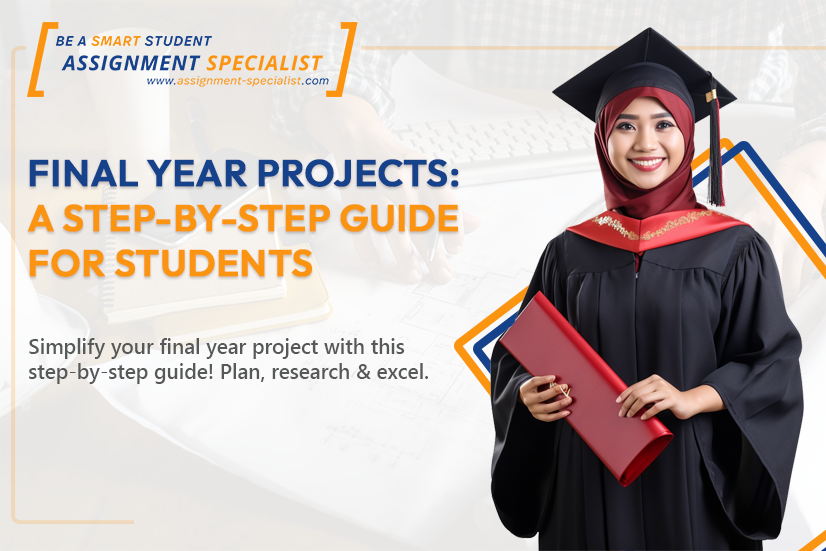Introduction
Final-year projects play a crucial role in a student’s academic and professional journey. They allow students to apply theoretical knowledge to real-world problems and demonstrate their research, problem-solving, and analytical skills. However, many students struggle with choosing the right topic, managing their time efficiently, and writing a structured report. This guide will walk you through each phase of writing a final year project, from selecting a topic to presenting your findings. Additionally, we’ll provide useful final-year project ideas to help you get started.
Key Takeaways
- Choosing a relevant and feasible topic is crucial for a successful project.
- Proper planning and time management will help you complete your project efficiently.
- Strong research and structured writing improve project quality.
- Seeking guidance from mentors and using online resources can enhance your work.
- Editing and proofreading ensure a polished final submission.
- Effective presentation skills improve the impact of your project defence.
Stressed about your final year project? Let’s make it easier!
Choosing the Right Topic
1. Aligning with Your Interests and Career Goals
Selecting a topic that interests you makes the project more engaging and helps in career progression. If your project aligns with your future career aspirations, it may also open doors to job opportunities and industry collaborations.
2. Researching Feasibility and Resources
Before finalising a topic, consider its feasibility. Are there enough resources available? Can you access the necessary data? Ensuring feasibility early on prevents roadblocks later.
3. Exploring Unique Final Year Project Ideas
If you’re unsure about a topic, research final-year project ideas in your field. Look at previous projects, trending research topics, and real-world industry problems to find inspiration.
Planning and Time Management
1. Setting Realistic Goals and Deadlines
Breaking your project into manageable phases—research, writing, testing (if applicable), and final editing—helps prevent last-minute stress.
2. Utilising Project Management Tools
Tools like Trello, Notion, and Gantt charts can help you track progress and meet deadlines efficiently.
3. Allocating Time for Each Project Phase
Schedule dedicated time for each phase, including research, draughting, data collection, and revisions. A well-structured timeline ensures a smooth workflow.
4. Avoiding Procrastination
Procrastination is a major hurdle for students. Use the Pomodoro technique or reward-based systems to stay motivated and productive throughout the project.
Need structured project planning? Let experts help you organise your work!
Research and Data Collection
1. Finding Credible Sources
Using reliable academic sources, such as journal articles, books, and industry reports, enhances the credibility of your research.
2. Conducting Surveys and Experiments
For projects requiring data collection, well-structured surveys and experiments provide valuable insights.
3. Avoiding Plagiarism in Your Research
Always cite sources correctly and use plagiarism detection tools like Turnitin to ensure originality.
4. Organising Research Data Efficiently
Use reference management tools like Zotero, EndNote, or Mendeley to store and organise research findings systematically.
Writing and Structuring Your Final Year Project
1.Creating a Clear Outline
A well-defined outline helps maintain a logical flow and ensures that all essential components are included.
2. Following Standard Writing Guidelines
Most universities require specific formatting styles such as APA, MLA, or IEEE. Adhering to these guidelines ensures compliance with academic standards.
3.Writing Each Section Effectively
- Introduction: Clearly state the problem, objectives, and scope.
- Literature Review: Summarise existing research and highlight gaps.
- Methodology: Explain research methods, tools, and processes used.
- Results and Discussion: Present findings with analysis.
- Conclusion and Recommendations: Summarise key insights and suggest future research directions.
4.Reviewing and Editing
Editing is crucial for clarity, coherence, and grammar. Proofread multiple times and seek feedback from mentors or peers.
5.Seeking Academic Support
If you struggle with structuring or formatting your project, seeking professional academic services can be beneficial.
Ensure your project meets academic standards with expert editing!
Final Year Project Presentation and Defence
1.Preparing a Strong Presentation
Use concise slides, visual aids, and clear explanations to effectively communicate your findings.
2. Handling Q&A Sessions with Confidence
Anticipate potential questions and practise well-researched responses.
3. Practising for a Smooth Delivery
Rehearse multiple times to gain confidence and reduce nervousness.
4. Engaging Your Audience
Maintain eye contact, use simple language, and make your presentation interactive to keep your audience engaged.
Overcoming Common Challenges
1.Managing Data Overload
Organise research findings systematically and use citation tools like Zotero or Mendeley to manage references.
2. Handling Writer’s Block
Take breaks, brainstorm with peers, and set daily writing targets to overcome writer’s block.
3. Seeking Help When Needed
Consult mentors, professors, or professional services if you face difficulties.
4. Learning from Past Mistakes
Analyse past projects and feedback to improve your work and avoid common errors.
Conclusion
Successfully completing final-year projects requires careful planning, thorough research, and structured writing. Whether you are writing a final year project or searching for final year project ideas, following this guide will help you navigate the process smoothly. By staying organised, seeking guidance, and refining your work, you can submit a high-quality project that meets academic standards and enhances your career prospects.
FAQs
1.How do I choose a good topic for my final year project?
Select a topic that aligns with your interests, career goals, and available research resources.
2.How long should my final year project be?
The length varies by university guidelines but generally ranges from 10,000 to 20,000 words.
3. What are some popular final-year project ideas?
Topics vary by field; for example, AI-based applications in computer science or renewable energy solutions in engineering.
4. How can I manage time effectively for my project?
Use project management tools, set deadlines, and break tasks into smaller milestones.
5. What’s the best way to prepare for my final year project defence?
Practice your presentation, anticipate questions, and refine your explanations based on feedback.


